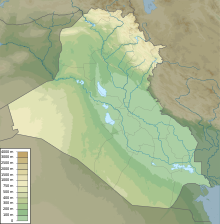The 1915 uprising in Karbala was an Arab uprising against the Ottoman Empire that took place in June 1915.
| 1915 uprising in Karbala | |||||||||
|---|---|---|---|---|---|---|---|---|---|
| Part of the Mesopotamian Campaign | |||||||||
 Aerial view of Karbala, 1918 | |||||||||
| |||||||||
| Belligerents | |||||||||
|
Rebels
|
| ||||||||
| Commanders and leaders | |||||||||
| No centralized leadership |
| ||||||||
Location within Iraq | |||||||||
Background
editEarlier, the Ottoman defeat in the Battle of Shaiba had damaged the authority of the Ottomans in the eyes of the Arabs,[1] and this was exacerbated by the successful ousting of the Ottomans in an uprising in Najaf, which showed the residents of Karbala the potency of a revolt, which they were willing to participate in since the Ottomans had been plundering food, money, and possessions from Karbalans to support the war effort.[2] Emissaries from Najaf had also begun encouraging an uprising in Karbala.[3] The successful ousting of the Ottomans in Najaf had also turned a potential revolt into a matter of civic pride: popular rhetoric included questions such as "Are the people of Najaf better than us, or braver, or more manly?".[4]
Uprising
editThe uprising began on 27 June 1915,[5] when the Bani Hasan tribe attacked government buildings in Karbala.[6] Ottoman deserters were also amongst the rebels.[4] The rebel tribesmen, lacking any centralized leadership,[2] burned municipal buildings, government schools, a hospital, and 200 dwellings in the suburbs, most of them belonging to Persians living and trading in the Arab community.[5] Charles R. H. Tripp notes that although the uprising was anti-Ottoman in a broad sense, it was not in support of the British war effort and instead intended to grant the city higher administrative autonomy.[7] The uprising ended with an Ottoman withdrawal, securing a rebel victory and Karbala's independence from the Ottoman Empire.[6]
Aftermath
editAfter becoming independent from the Ottoman Empire, Karbala turned into a place of refuge for Ottoman deserters.[6] However, Karbala suffered from a lack of centralized leadership, and was unable to establish contact with the British forces to the south due to tribes still loyal to the Ottoman Empire separating them.[6] The Ottoman Empire re-established control of Karbala in 1916 following their victory in the Siege of Kut.[6]
See also
editReferences
edit- ^ Charles Townsend, Desert Hell, The British Invasion of Mesopotamia (Harvard University Press, Cambridge, Massachusetts, 2010), 90-91.
- ^ a b "27 June 1915 - Karbala". The Great War Blog. 2015-06-27. Archived from the original on 22 September 2015. Retrieved 2019-11-19.
- ^ Kramer, Martin; Bakhash, Shaul; Bailey, Clinton; Fischer, Michael M. J. (2019-05-28). "Chapter 7 - The Iraqi Shi'is and their fate". Shi'ism, Resistance, And Revolution. Routledge. ISBN 978-1-000-31143-3.
emissaries from Najaf encouraged similar rebellions in Karbala and nearby Hilla, also predominantly Shi'i.
- ^ a b Rogan, Eugene (2015-02-26). The Fall of the Ottomans: The Great War in the Middle East, 1914-1920. Penguin UK. ISBN 978-0-14-196870-4.
- ^ a b Rogan, Eugene (2015-02-26). "Chapter 9 - The Invasion of Mesopotamia". The Fall of the Ottomans: The Great War in the Middle East, 1914-1920. Penguin Books Limited. ISBN 978-0-14-196870-4.
- ^ a b c d e Tauber, Eliezer (2014-03-05). The Arab Movements in World War I. Routledge. p. 30. ISBN 9781135199784.
- ^ Tripp, Charles; Tripp, Professor of Middle East Politics Charles (2002-05-27). A History of Iraq. Cambridge University Press. p. 33. ISBN 9780521529006.
